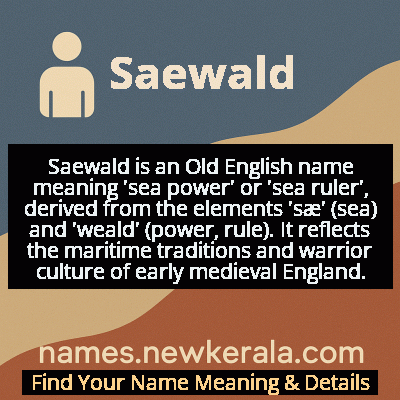Saewald Name Meaning & Details
Origin, Popularity, Numerology Analysis & Name Meaning of Saewald
Discover the origin, meaning, and cultural significance of the name SAEWALD. Delve into its historical roots and explore the lasting impact it has had on communities and traditions.
Name
Saewald
Gender
Male
Origin
Christian
Lucky Number
2
Meaning of the Name - Saewald
Saewald is an Old English name meaning 'sea power' or 'sea ruler', derived from the elements 'sæ' (sea) and 'weald' (power, rule). It reflects the maritime traditions and warrior culture of early medieval England.
Saewald - Complete Numerology Analysis
Your Numerology Number
Based on Pythagorean Numerology System
Ruling Planet
Moon
Positive Nature
Diplomatic, friendly, artistic, empathetic.
Negative Traits
Over-sensitive, moody, indecisive, prone to self-pity.
Lucky Colours
Green, cream, white.
Lucky Days
Monday.
Lucky Stones
Pearl, moonstone.
Harmony Numbers
1, 3, 4.
Best Suited Professions
Diplomats, mediators, caregivers, artists.
What People Like About You
Cooperative spirit, friendliness, artistic talent.
Famous People Named Saewald
Saewald of Essex
Anglo-Saxon King
Co-ruler of the Kingdom of Essex during early Christianization period
Saewald the Navigator
Explorer
Established early Norse-British trade routes in the 9th century
Saewald of York
Religious Leader
Early Christian bishop who established monastic traditions in Northern England
Saewald Thorsson
Scholar
Preserved important Anglo-Saxon manuscripts during Norman conquest
Name Variations & International Equivalents
Click on blue names to explore their detailed meanings. Gray names with will be available soon.
Cultural & Historical Significance
Extended Personality Analysis
The name Saewald suggests a personality characterized by a unique blend of depth and authority. Individuals with this name are often perceived as having the emotional complexity and intuition associated with water elements, combined with the strength and leadership qualities of traditional rulers. They typically demonstrate remarkable resilience, able to weather emotional storms while maintaining clear direction and purpose. The historical context of early Christian kingship adds layers of moral conviction and spiritual depth to this personality profile. Saewalds are often drawn to positions where they can guide others through turbulent times, whether as leaders, counselors, or protectors. They tend to possess strong analytical abilities combined with deep empathy, making them effective in roles requiring both strategic thinking and human understanding. The maritime symbolism suggests adaptability and the ability to navigate changing circumstances, while the power element indicates natural authority that inspires confidence in others.
Modern Usage & Popularity
In contemporary naming practices, Saewald occupies a unique niche as an extremely rare but historically significant choice. The name sees occasional use among families with strong interests in Anglo-Saxon history, maritime heritage, or early Christian traditions. Modern usage is primarily concentrated in the United Kingdom, with occasional instances in countries with significant English diaspora communities. While too rare to appear in official naming statistics, online naming forums and historical interest groups show growing appreciation for such authentic medieval names. The name appeals to parents seeking distinctive but meaningful names that avoid modern trends while maintaining strong masculine connotations. Recent years have seen slight increases in usage, possibly influenced by popular media featuring Anglo-Saxon settings and growing interest in genealogical research. However, Saewald remains firmly in the category of 'uncommon historical names' rather than mainstream choices.
Symbolic & Spiritual Meanings
Symbolically, Saewald represents the powerful convergence of natural forces and human mastery. The sea element carries rich symbolic weight across cultures - representing the unconscious mind, emotional depth, mystery, and the source of life itself. Combined with the concept of power or rulership, this creates a potent symbol of someone who can navigate profound depths while maintaining conscious control and direction. In Christian symbolism, the sea often represents both the chaotic waters of creation and the journey of faith, while rulership reflects divine order and stewardship. This makes Saewald symbolically rich for representing individuals who bridge different realms - whether spiritual and worldly, emotional and rational, or natural and civilized. The name suggests mastery over inner and outer worlds, making it symbolically appropriate for leaders, explorers, and those who venture into unknown territories while maintaining their core identity and purpose.

